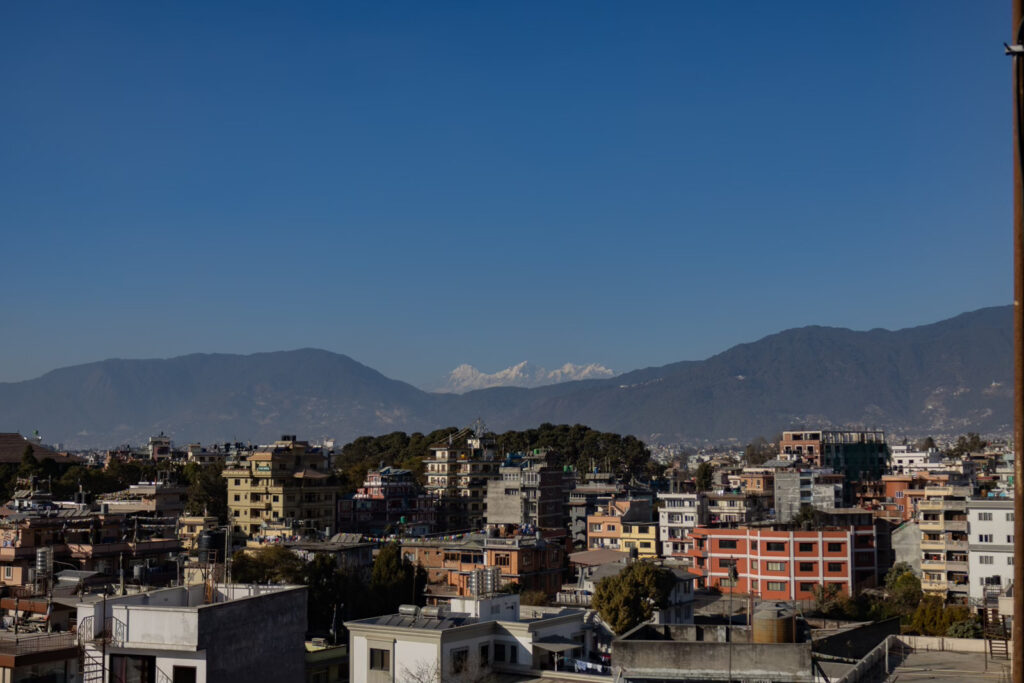Students’ trip to Nepal focuses on civic engagement
4 min read
Students had the opportunity to visit local Nepali cultural and religious sites. Photo courtesy of Nathan Francis
by MADISON MCCALLUM
Staff Writer
Over winter break, twelve students spent two weeks in Nepal on a faculty-led study abroad trip focused on civic engagement. Led by David Rettinger, psychology professor and director of academic integrity programs, and Sarah Dewees, director of the Center for Community Engagement, the group participated in walking tours, dined in local restaurants, enjoyed traditional entertainment and engaged with local schools and government through service projects.
“Having the opportunity to see another part of the world so far away from home, with other peers your age, led by two faculty members, is an experience unlike any other,” said junior political science major Nathan Francis.
The students spent the last eight weeks of the fall semester in “International Perspectives on Civic Engagement: Nepal,” a course taught by Rettinger. They studied a broad range of topics related to Nepal, including its history, culture, economy and art, with a primary focus on different strategies for positive social change through non-governmental organizations. According to NGO Source, a non-governmental organization is “a voluntary group or institution with a social mission, which operates independently from the government.”
The students’ classroom experience, according to senior psychology major Tyler Clift, was meant to provide them with a strong understanding of the role external facilitators, like NGOs, play in social advancement, as well as social enterprises and the impact local government plays when in regard to preserving architecture and history through historic preservation.
“A memorable moment was visiting the non-governmental organization of Slisha, which supports women and children through micro-loans to entrepreneurs and by providing early childhood education for the children of female entrepreneurs,” said Dewees. “We got to visit their office and learn more about their programs, and then we visited one of their early childhood education centers. It was inspirational to learn about their work and see one of their programs in action.”
Attendees had opportunities to gain cross-cultural knowledge through visits to local Nepali cultural and religious sites and by interacting with the community. They also visited schools, government offices and non-governmental organizations.
“We had the privilege of visiting Slisha’s main office, then we went out into the city to visit one of their program sites, an Early Childhood Development Center, that provides education and resources to young children,” said senior psychology major Grace Pippin. “Seeing the success and change coming forth from the programs Slisha started was incredibly meaningful.”
Between exploring the medieval city of Bhaktapur, Kathmandu, Boudhanath, the Pashupatinath and Swayambhunath Temples, along with both Hindu and Buddhist pilgrimage sites in the mountains of Pharping, students and faculty took time to visit local schools and interact with the students there.
Spending time with the students of Sagarmatha Children’s Home, the UMW students played with the locals, participating in popcorn reading and coloring, which particularly stood out to Clift.
“When we were drawing, the kids actually, on their own, each grabbed a book and started drawing the covers of the books on their own sheets of paper. They were all really great artists, way better than me anyway,” said Clift. “It was a very special time that I know I will always hold close to my heart.”
For the entirety of their trip, pollution had hung over the city, preventing its notable scenery from being seen from the town. But on the groups’ last evening, the covers lifted and brought a memorable experience to the students before they traveled back to the states. Venturing upward on a nearby mountain in Nagarkot, Nepal, the group was met with a panoramic view of the Himalayan Mountain range as the sun set in the distance.
“The reactions of all of the students, seeing the mountains, and my own personal emotions are something that I will never forget,” said Francis. “There is something so indescribably powerful about being in the midst of, and getting to see, the tallest mountains in the world, and I will remember that feeling for the rest of my life.”
Formed in 2015 following devastating earthquakes in Nepal, the Kathmandu-Fredericksburg Sister City initiative was created to support “current and future exchanges fostering cross cultural understanding and positive outcomes in community service and the environment, academic exchanges between the University of Mary Washington and Tribhuvan University in Nepal, arts and culture, business, trekking and tourism,” according to its website. The group was able to arrange a variety of meetings and experiences for the students to further their understanding and knowledge.
“The relationships that have formed through this relationship helped us to have some of the greatest experiences on this trip,” said Francis.
UMW offers various opportunities throughout the year to any student interested in studying abroad and gaining first-hand experience in activities not accessible in Fredericksburg, Va., regardless of academic interest or financial situation.
“Don’t be afraid to take risks and try new things,” said Jose Sainz, director of the Center for International Education. “When you get outside your comfort zone, you really gain valuable experiences and make life-long memories.”
Despite the students’ shared concerns of dealing with over 20 hours of travel, an 11-hour time difference and the fear of exploring regions unknown to them, the students returned home shortly before the start of the semester with experiences they never imagined they would have.
“I have such genuine experiences and memories from my time away, ones that I will always cherish,” said Pippin. “The drawback to this trip is that it was very short, way too short. While I was able to make some wonderful connections with people while there, it was not long enough to be able to get to know people even better and pursue those relationships even further with the NGOs. Now, it makes me want to go back and spend more time in Nepal, more than ever.”











